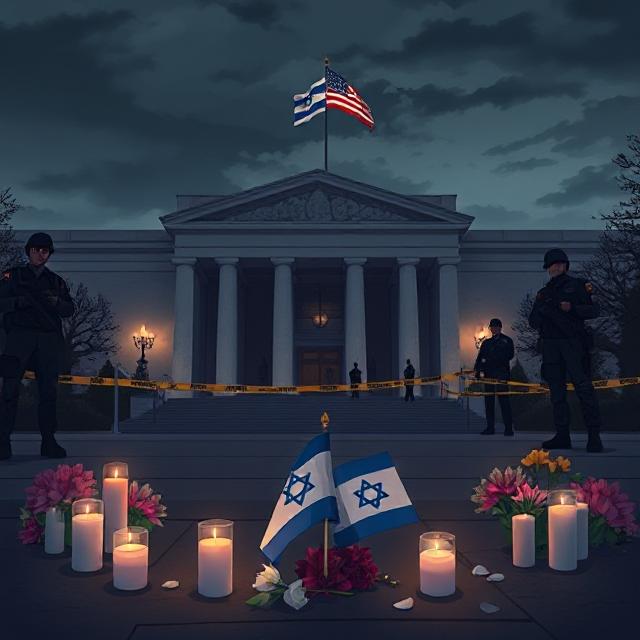In a city known for diplomacy and global engagement, Washington DC was rocked by a chilling act of violence this week. Two Israeli embassy members were shot dead outside a prominent Jewish museum, sending shockwaves across international communities. The incident has raised urgent questions about the security of Israeli diplomats, the motivations behind the attack, and what it signals for Israel and its relations abroad.

A Chilling Attack Near the Heart of Israel’s Diplomatic Presence in DC
It was just another afternoon in the bustling capital—until it wasn’t. Near the Jewish Heritage Museum, gunfire erupted. Two Israeli embassy officials lost their lives in a deadly shooting, triggering an immediate security lockdown across the vicinity.
Eyewitnesses described a “sudden eruption of chaos”—tourists and locals fleeing the scene, sirens wailing, and a flood of emergency personnel converging in moments. While the suspects escaped the scene, local and federal authorities, joined by Israeli intelligence, swiftly initiated an intensive manhunt to track down those responsible.
What Happened: Timeline of the Incident
The gunfire erupted mere steps from Israel’s diplomatic hub, inside a highly visited museum near the embassy.Eyewitnesses report two assailants entering the premises before opening fire on the unsuspecting embassy personnel.
Two Israeli diplomats were fatally shot, leading to an immediate lockdown and large-scale evacuation of nearby buildings. The attackers fled the scene, prompting an intensive manhunt by U.S. law enforcement, with critical assistance from Israeli intelligence agencies like Mossad and Shin Bet.
Local authorities, along with the U.S. Diplomatic Security Service, rapidly launched an investigation, reviewing surveillance footage and combing through digital evidence.
You might be interested in this topic: Trump Gold Card 2025
Global Reactions: Condolences, Solidarity, and Strategic Alarm
In the hours following the attack, President Biden issued a heartfelt statement, expressing condolences and reaffirming the United States’ unwavering commitment to Israel’s safety.
“This attack on diplomatic staff is an attack on diplomacy itself,” Biden declared. “The U.S. Amid the ongoing crisis, the United States has reaffirmed its firm and unwavering alliance with Israel, signaling deep diplomatic solidarity.
Across the globe, world leaders echoed similar sentiments, condemning the violence and calling for justice. In response to the violent attack, Israeli Prime Minister Benjamin Netanyahu pledged immediate and forceful action to safeguard national interests.
Many diplomatic observers are drawing comparisons to past incidents involving embassies in volatile regions, but this case is unique due to its location and timing.
For additional context on Israel’s diplomatic presence in Washington D.C., visit the official Israeli Embassy site.
Security Gaps and Diplomatic Vulnerabilities
Israel operates one of the world’s most advanced diplomatic security systems, with layers of protection often guided by elite agencies such as Mossad and Shin Bet. However, this incident revealed a rare but significant breach.
Experts at the Council on Foreign Relations suggest that while Israel’s diplomatic sites are well-protected, soft targets like public buildings adjacent to embassies remain vulnerable.
The attackers reportedly exploited a public-access wing of the museum, highlighting potential lapses in coordination between embassy security and adjacent civilian institutions.
What This Means for Israel’s Foreign Policy
This tragic event is more than an isolated act of violence—it is a stark reminder of the fragile balance we walk in global diplomacy. This tragic incident has reinforced Israel’s urgency to reassess security strategies at its diplomatic missions and strengthen global security alliances.
Enhanced security measures and detailed vulnerability assessments are likely to be top priorities in the coming months. Israeli officials are expected to propose new standards for securing diplomatic staff, particularly in allied nations.
Moreover, incidents like this can trigger deeper political consequences. In response to the violent attack, Israeli Prime Minister Benjamin Netanyahu pledged immediate and forceful action to safeguard national interests.
The incident also highlights a dangerous trend:
| Year | Country | Incident | Outcome |
|---|---|---|---|
| 2012 | India, Georgia | Embassy vehicles attacked | Injuries, no fatalities |
| 2023 | Argentina | Bomb scare at Israeli cultural center | Diffused, suspects arrested |
| 2025 | USA | 2 Israeli embassy staff shot dead | Ongoing investigation |
The Human Side: Advocating Peaceful Dialogue Amid Global Divides
Israel operates One of the slain diplomats was known for advocating peace and cooperation. During a recent youth leadership summit, he spoke about the importance of dialogue over division, calling for more cultural exchanges and less political polarization.
His death is a blow not just to his family and nation, but to the ideals of diplomacy and peaceful negotiation he so passionately championed.
Moving Forward: Policy, People, and Preparedness
The key lessons from this attack include:
- Increased threat awareness even in “safe zones”
- Real-time intelligence sharing among allies
- Tighter protocols for embassies situated near public spaces
- Boosting Security with Advanced AI-Powered Surveillance and Threat Detection Technologies
As the world mourns, Israel must also lead—by redefining what modern diplomatic security looks like in the 21st century.
Conclusion: A Time for Reflection and Action
This tragedy is more than just a headline. This tragic event serves as a powerful reminder of the delicate nature of global diplomacy—urging Israel to urgently reassess and strengthen its diplomatic safety protocols. For the world, it’s a call to confront hate, strengthen cross-border cooperation, and stand in solidarity against violence.
FAQs
1. Where did the shooting take place?
The attack occurred inside a museum near the Israeli Embassy in Washington D.C.
2. Who were the victims?
Two Israeli diplomatic staff members.
3. Were the attackers identified?
As of now, they remain unidentified but are actively being pursued.
4. Was this a terror-related act?
Authorities are exploring every possible lead, including potential links to terrorism.
5. What has the Israeli government said?
The Israeli PM vowed swift justice and international cooperation.
6.How did the U.S. respond?
President Biden issued a public statement offering full support.
7. What is Mossad’s involvement?
Mossad is playing a pivotal role in the ongoing investigation, offering high-level intelligence collaboration and data-driven insights.
8. Has security changed since the attack?
Yes, immediate upgrades were made to all Israeli foreign missions.
9. What are experts saying about this?
Think tanks like the Council on Foreign Relations are calling for a reassessment of global diplomatic protocols.
10. Is this incident related to larger geopolitical tensions?
It may be, though investigations are ongoing..
11.How safe are other Israeli embassies?
Security levels are being reassessed and upgraded worldwide.
12. Will this affect Israel’s foreign policy?
Likely yes, especially regarding alliances and strategic planning.
Final Thoughts & Call to Action
This heartbreaking incident not only shakes Israel, but also signals a broader vulnerability in international diplomacy. As nations come together in support, it’s also time to act.
Let’s not wait for another tragedy.
- Share this story to spread awareness
- Subscribe for updates on global diplomatic events.
- Comment below with your thoughts on how global diplomacy must evolve in today’s world
Call to Action: If this story moved you, share your thoughts in the comments, explore our related posts on global diplomacy and security, and subscribe for timely updates on international affairs involving Israel.




